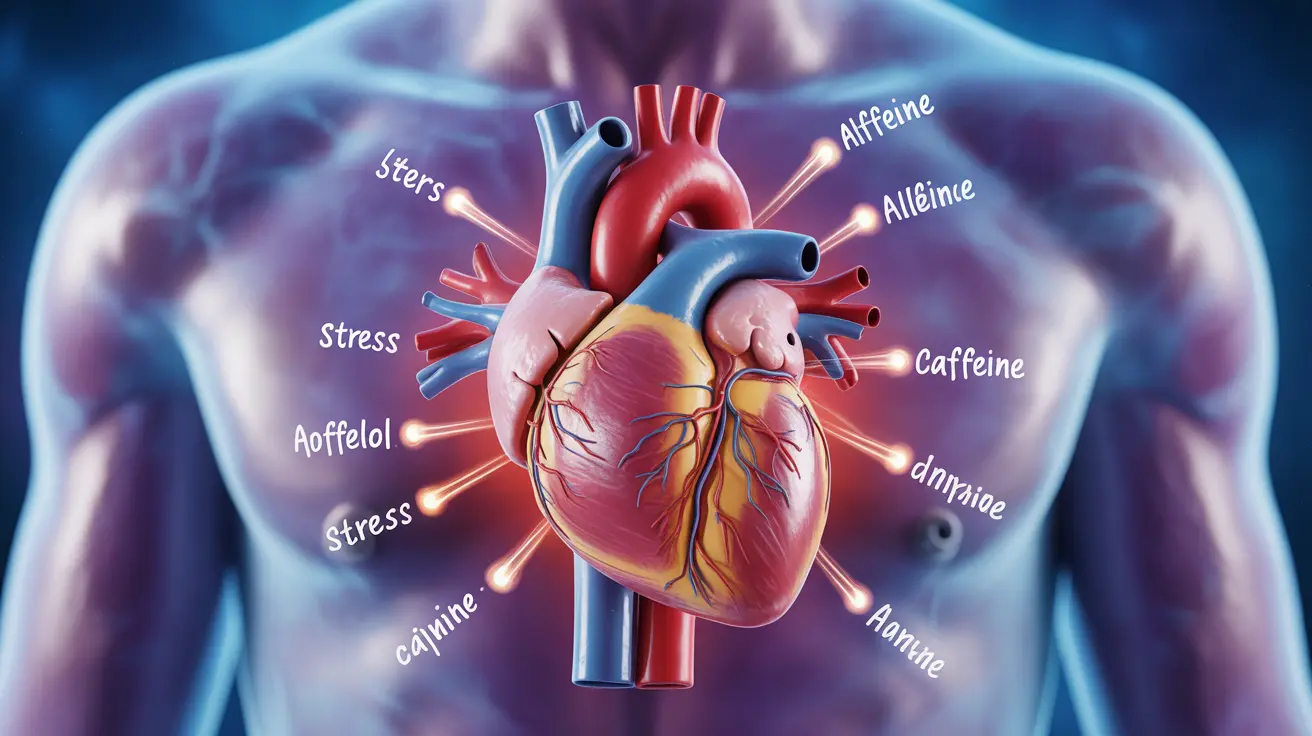Have you ever felt your heart skip a beat or flutter in your chest? This sensation, known medically as heart palpitations, is a common experience that can range from harmless to potentially serious. Understanding what causes heart skipping beats and recognizing when they warrant medical attention is crucial for maintaining heart health.
While occasional heart palpitations are usually benign, knowing the underlying causes and warning signs can help you make informed decisions about your cardiac health. Let's explore the various aspects of heart skipping beats, from common triggers to prevention strategies.
Common Causes of Heart Skipping Beats
Heart palpitations can occur due to various factors, ranging from everyday lifestyle habits to underlying medical conditions:
Lifestyle Factors
- Caffeine consumption
- Stress and anxiety
- Lack of sleep
- Dehydration
- Strenuous exercise
- Nicotine use
- Alcohol consumption
Medical Conditions
- Thyroid disorders
- Anemia
- Electrolyte imbalances
- Heart rhythm disorders
- Structural heart problems
- Hormonal changes during pregnancy or menopause
Warning Signs and Red Flags
While many cases of heart skipping beats are harmless, certain symptoms should prompt immediate medical attention:
- Chest pain or pressure
- Shortness of breath
- Dizziness or fainting
- Severe anxiety
- Unusual sweating
- Persistent irregular heartbeat
- Heart palpitations during physical activity
Diagnostic Approaches
Healthcare providers may use several tests to determine the cause of heart palpitations:
- Electrocardiogram (ECG)
- Holter monitor
- Event recorder
- Blood tests
- Echocardiogram
- Stress test
Managing Heart Palpitations Through Lifestyle Changes
Several lifestyle modifications can help reduce the frequency of heart palpitations:
- Limiting caffeine and alcohol intake
- Practicing stress-reduction techniques
- Maintaining regular sleep patterns
- Staying hydrated
- Engaging in moderate exercise
- Following a heart-healthy diet
- Avoiding trigger foods and substances
Frequently Asked Questions
What are the common causes of heart skipping beats or palpitations?
Heart skipping beats can be caused by various factors including caffeine, stress, anxiety, dehydration, certain medications, thyroid problems, and underlying heart conditions. Lifestyle factors such as lack of sleep, excessive alcohol consumption, and strenuous exercise can also trigger palpitations.
When should I be worried about skipped heartbeats and see a doctor?
Seek immediate medical attention if your heart palpitations are accompanied by chest pain, difficulty breathing, dizziness, fainting, or severe anxiety. Also consult a healthcare provider if your palpitations are frequent, persistent, or occur during physical activity.
How can lifestyle changes help reduce heart palpitations?
Lifestyle modifications such as reducing caffeine and alcohol intake, managing stress through relaxation techniques, maintaining regular sleep patterns, staying hydrated, and exercising moderately can significantly reduce the frequency of heart palpitations.
What symptoms usually accompany dangerous heart rhythm problems?
Dangerous heart rhythm problems often present with symptoms like chest pain, shortness of breath, dizziness, fainting, unusual sweating, and severe anxiety. These symptoms, especially when occurring together, require immediate medical evaluation.
What tests do doctors use to diagnose causes of heart skipped beats?
Doctors typically use various diagnostic tools including electrocardiograms (ECG), Holter monitors, event recorders, blood tests, echocardiograms, and stress tests to determine the underlying cause of heart palpitations. The specific tests ordered will depend on your symptoms and medical history.
Remember, while heart palpitations can be concerning, understanding their causes and knowing when to seek medical attention can help you manage them effectively. Always consult with a healthcare provider for persistent or concerning symptoms.




